Rugs, Cosmetics, Motorbikes: Israeli Soldiers Are Looting Gaza Homes en Masse
PALESTINE - ISRAEL, 26 Feb 2024
Oren Ziv | +972 Magazine – TRANSCEND Media Service
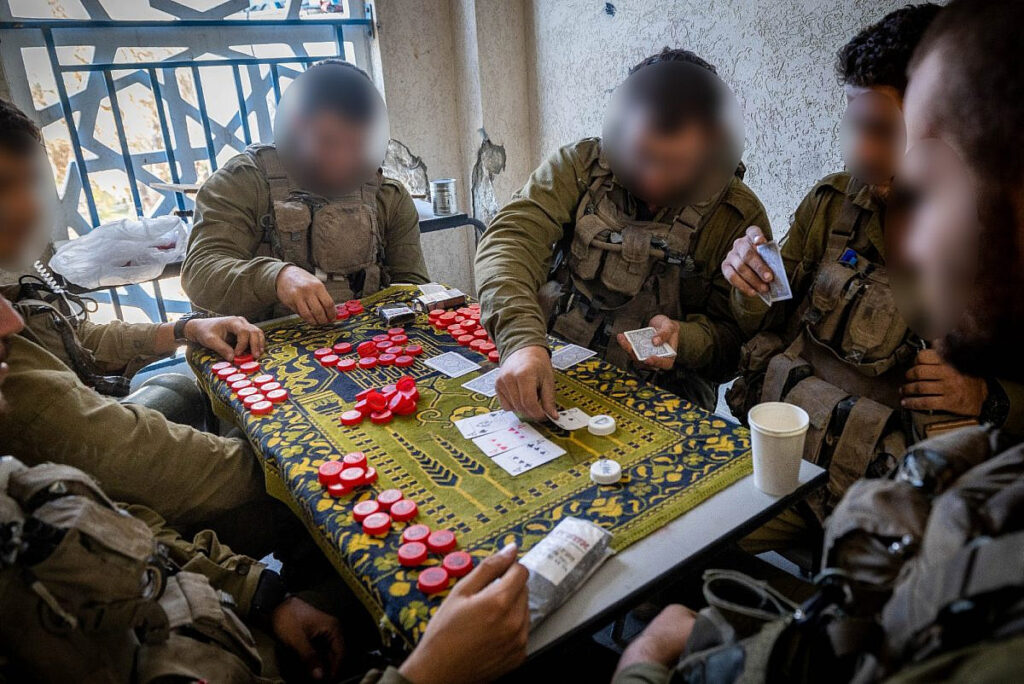
Israeli soldiers play cards inside a building in Al-Shati refugee camp, northern Gaza Strip, 16 Nov 2023. (Yonatan Sindel/Flash90)
Soldiers describe how stealing Palestinian property has become totally routine in the Gaza atrocities, with minimal pushback from commanders.
20 Feb 2024 – Israeli soldiers fighting in Gaza have not been shy about posting videos on social media gleefully documenting their wanton destruction of buildings and humiliation of Palestinian detainees. Some of these clips were even exhibited in South Africa’s presentation at the International Court of Justice last month as evidence of genocide. But there is another war crime being readily documented by Israeli soldiers that has garnered less attention and condemnation despite its prevalence: looting.
In November, the Palestinian singer Hamada Nasrallah was shocked to discover a TikTok of a soldier playing the guitar that his father had bought him 15 years earlier. Other videos uploaded to social media in recent months show Israeli soldiers boasting about finding wristwatches; unboxing someone’s collection of soccer shirts; and stealing rugs, groceries, and jewelry.
In a Facebook group for Israeli women comprising nearly 100,000 users, someone wondered what to do with the “gifts from Gaza” that her partner, a soldier, had brought back for her. Sharing a photo of cosmetic products, she wrote: “Everything is sealed except for one product. Would you use these? And does someone know the products or are they only in Gaza?”
Indeed, since the start of Israel’s ground invasion in late October, soldiers have been taking whatever they can get their hands on from the homes of Palestinians who have been forced to flee. More than an open secret, the phenomenon has been widely — and uncritically — reported in the Israeli media, while rabbis from the Religious Zionist movement have been answering soldiers’ questions about what is permissible to loot according to Jewish law.
Soldiers who returned from fighting in Gaza confirmed to +972 Magazine and Local Call that the phenomenon is ubiquitous, and that for the most part their commanders are allowing it to happen. “People took things — mugs, books, each one the souvenir that does it for him,” said one soldier, who admitted that he himself took a “souvenir” from one of the medical centers that the army occupied.
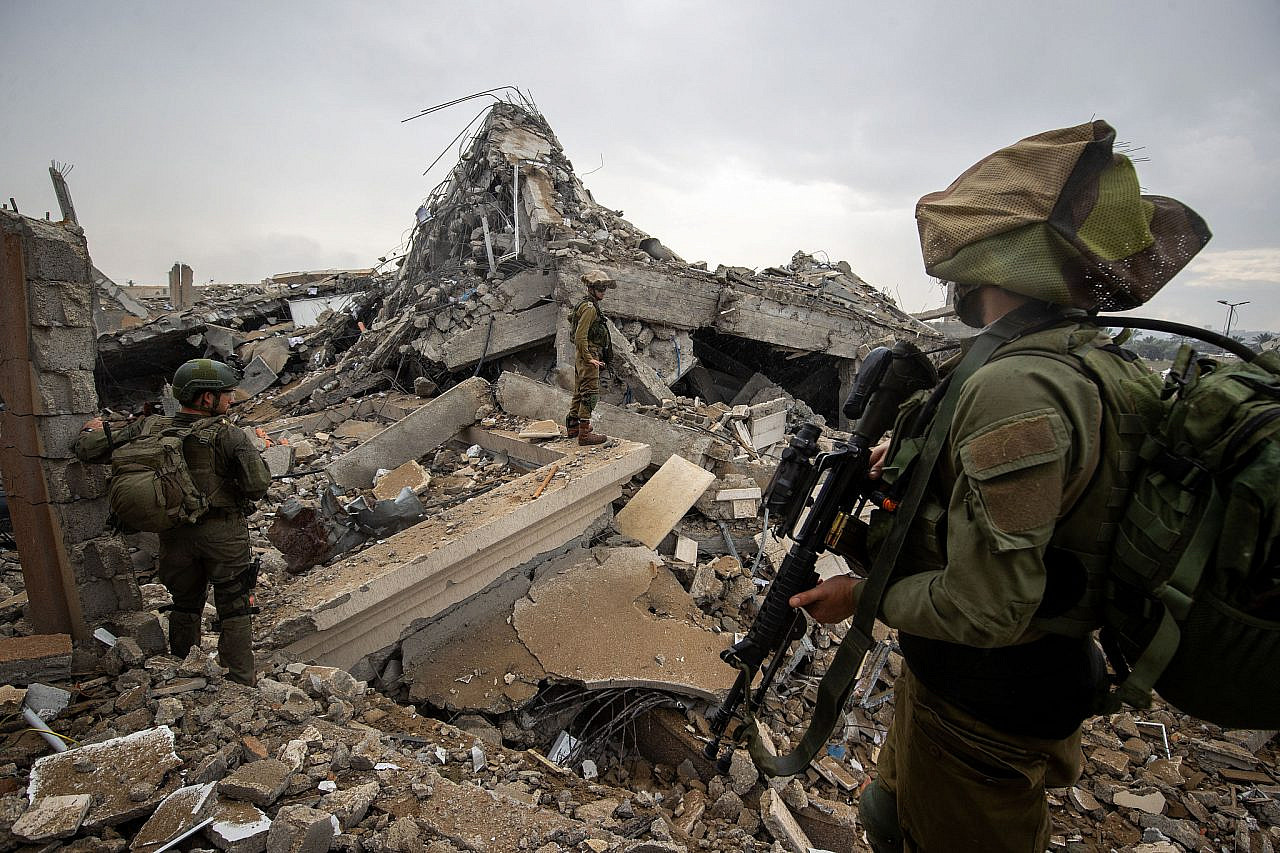
Another soldier, who served in northern and central Gaza, testified that soldiers “took rugs, blankets, [and] kitchen utensils,” and explained that there was no briefing on the matter from the army either before entering or while in the field. “There was zero talk about it from the commanders,” he said. “Everyone knows that people are taking things. It’s considered funny — people say: ‘Send me to The Hague.’ It doesn’t happen in secret. The commanders saw, everyone knows, and no one seems to care.”
The soldier offered his explanation for why the phenomenon is so widespread: “There is something about this reality in which the house is already [in ruins] that allows you to take a plate or rug. In one of the operations, in a destroyed house, there was a cupboard with antique kitchen utensils, special plates, special mugs. I saw them being looted, unfortunately.”
“[The commanders] didn’t really talk to us about it,” another soldier testified. “They didn’t say you couldn’t take things. And most people felt the need to take a souvenir.”
The soldier noted that the looting was no secret; indeed, some of their seniors were doing it too. “The company sergeant major distributed Qur’an study books that he found and gave to whomever wanted them,” he said. “Another soldier took a set of coffee mugs, a serving tray, and a pot. Another unit, whom we met after they returned from a tour, brought a motorcycle, like the Nukhba [Hamas special forces] motorcycles. One of the soldiers declared that it was his. They [the soldiers] talked about renovating it.”
Another soldier who served in Gaza told +972 and Local Call that soldiers took “prayer beads, spoons, glasses, coffee pots, jewelry, rings. Whatever is easy and accessible is taken. Not everything, but people felt like the lords of the land.” He noted also that “maps from children’s textbooks were taken to show how they are taught there.”
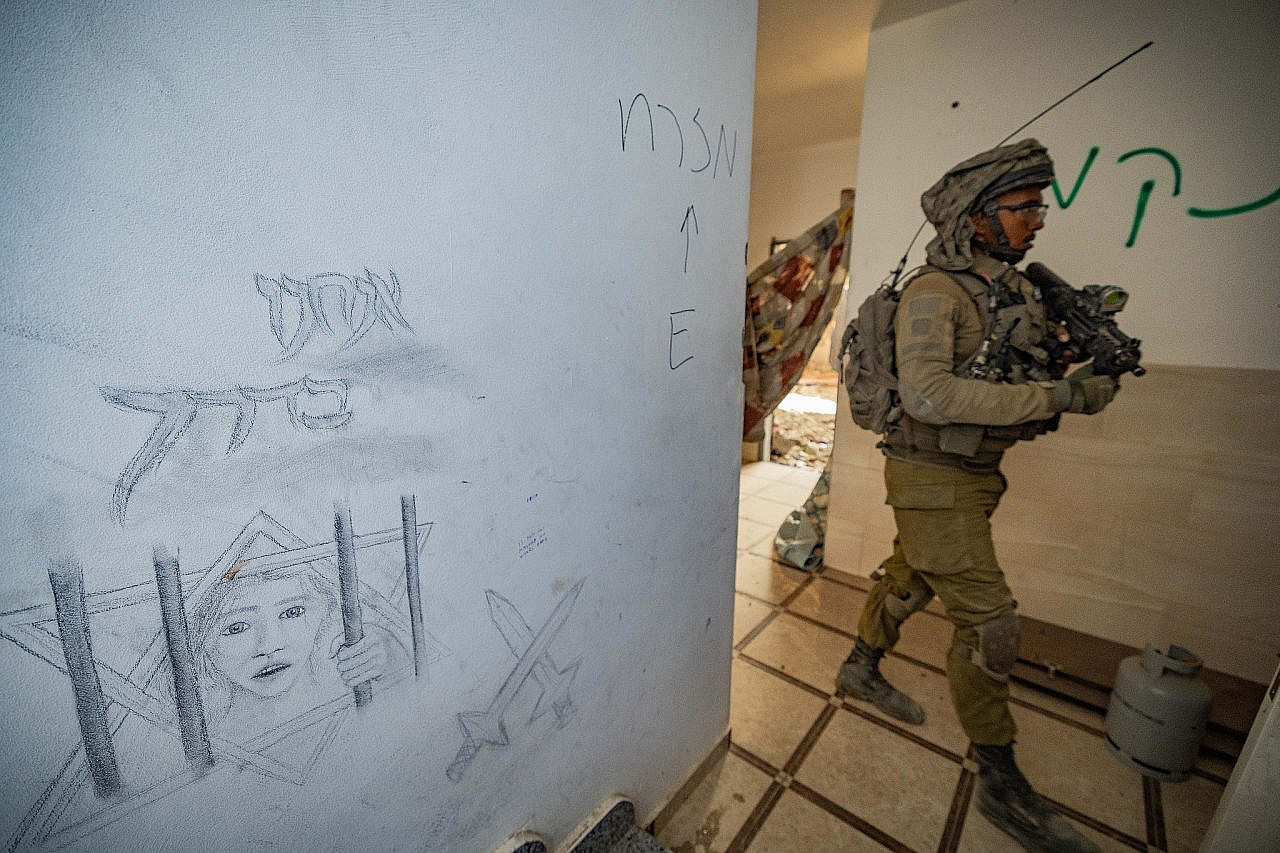
In contrast to the others who testified, this soldier said that it was clear to him that looting was forbidden. “In my experience, of course, it’s a big no no,” he explained. “They emphasized this issue, but no one supervises the reservists. The most common thing [to steal] is ‘local souvenirs’ [i.e. quintessentially Palestinian or Arab items]. Once, they kicked out a soldier who stole money.”
The soldier added that he and his team tried, with varying degrees of success, to persuade other soldiers to leave behind the items they had stolen in Gaza. “They [soldiers] would come back with things; we told them it was better to leave them [inside the Strip, near the fence], it’s better to throw them away than to take them.”
‘From the ruins of Khan Younis, in the classic Gazan style’
In a communique this week to commanders in charge of units fighting in Gaza, IDF Chief of Staff Herzi Halevi urged soldiers “not to take anything that is not ours.” But this letter comes after several months in which looting has become completely routine.
So normalized is the phenomenon that in a recent segment on Israel’s public broadcaster, Kan, soldiers presented reporter Uri Levy with a mirror they had brought back from Gaza. “From the ruins of Khan Younis, in the classic Gazan style,” Levy jokes, without asking the soldiers where they found the mirror or why they stole it. In a column on Ynet, Nahum Barnea quotes a soldier who said he saw the looting of “phones, vacuum cleaners, motorcycles, and bicycles.”
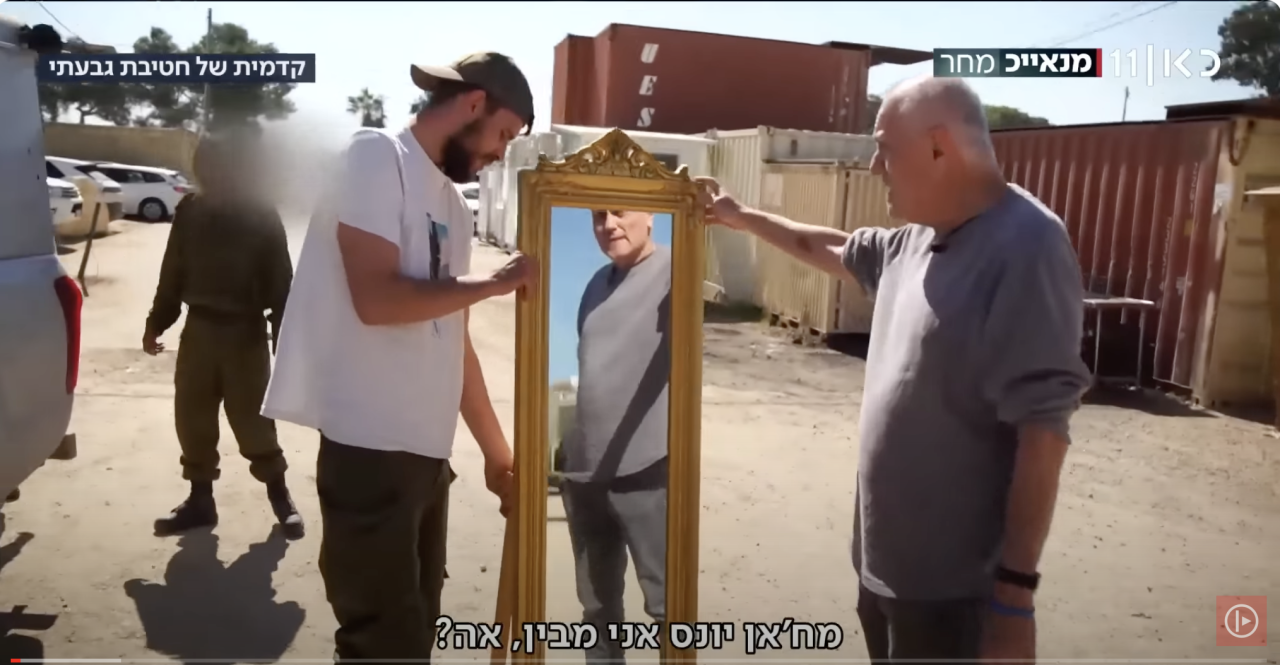
Channel 13 also reported on the phenomenon earlier this month. Rather than condemning it, however, the presenters simply noted that the videos are being shared around the world to “shame” Israeli soldiers. (The segment also included an interview with the soldier who filmed himself with the wristwatches he found inside a Palestinian home, who claims that he did not steal them: “They see me holding watches, not looting, nothing … My intention was to show that the Hamas leadership lives there at a high level.”)
Another sign of how widespread the phenomenon has become is the fact that rabbis from the Religious Zionist movement have been receiving questions from soldiers on the issue. In a Q&A uploaded to YouTube, Rabbi Yitzchak Sheilat of the Ma’ale Adumim Yeshiva in the occupied West Bank noted that looting is forbidden.
“This is a very serious issue, in two respects: in terms of halacha [Jewish law] and military law,” he said. “Halacha permits looting only food or perishable things from the enemy … taking objects is strictly prohibited. According to halacha, all the spoils must go to the king, that is, the army commander … It would be a shame for someone to be caught and have to pay a heavy price.”
One of the soldiers asked the rabbi if it is permissible to take things from a house before it is demolished. “It is forbidden to take things,” Sheilat answered. “If you take something, it must be handed over to the chief of staff.” “And if a commander approves taking things for the company?” a soldier asked. “No, that’s exactly the problem, that there are commanders who don’t know military law, or don’t want to know, and suddenly they allow guys [to do] things they shouldn’t allow,” Sheilat replied.
However, Rabbi Shmuel Eliyahu, the chief rabbi of the northern city of Safed, offered a different perspective on the issue in a Q&A of his own. He explained that because the “Arabs in Gaza do not observe international conventions, we are not obliged to abide by any of the rules of war. Nonetheless, we are very careful, because we want to preserve the image of God within us.”
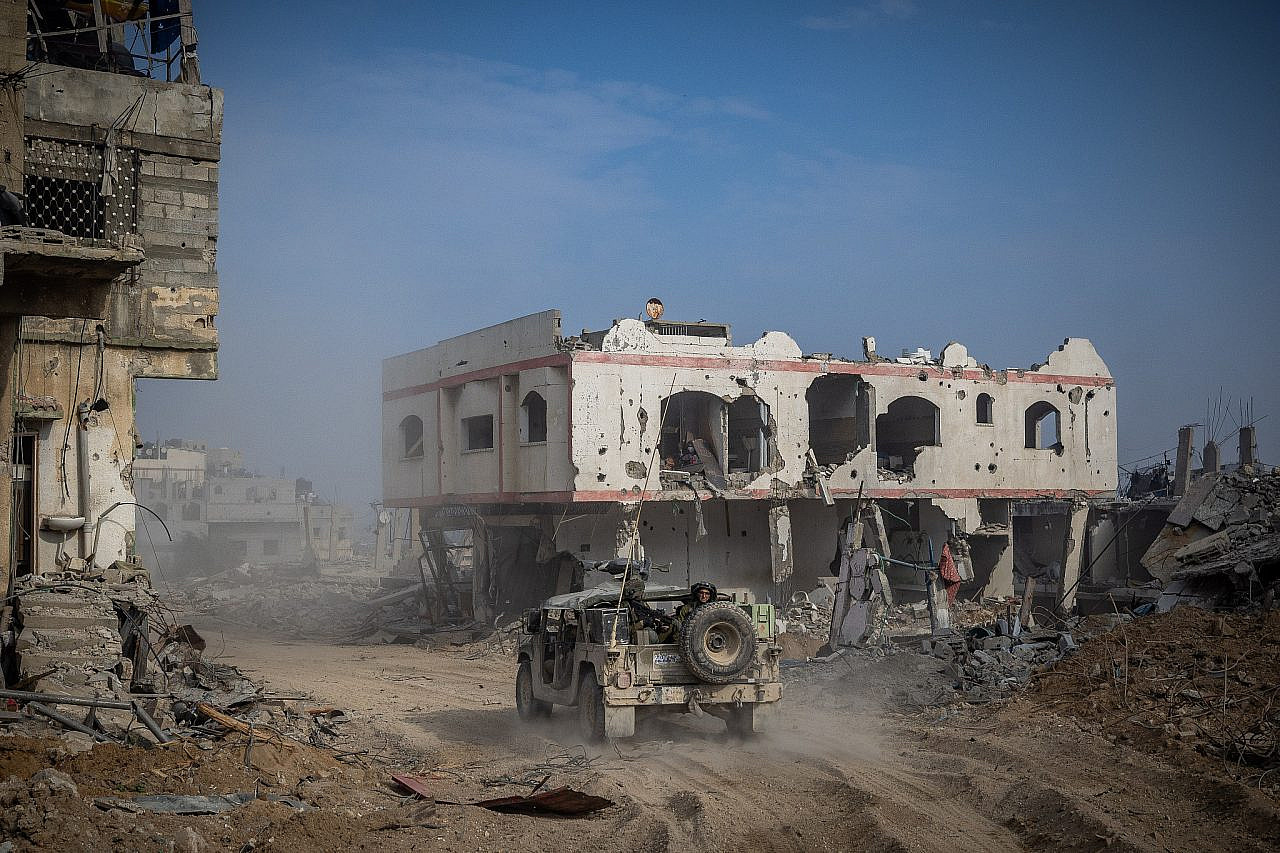
It should be noted that in addition to the “independent” looting by soldiers, there is a special unit in the Israeli army dedicated to seizing money and other property found in the battlefield. So far, it is known that the military has seized tens of millions of shekels from Gaza, which it claims belonged to Hamas.
‘And you shall eat the riches of all the nations’
Alongside the looting of Palestinians’ belongings, Israeli soldiers are also routinely eating the food they find in Gaza’s abandoned homes. “After two or three weeks, soldiers use whatever they find, clean it, and disinfect it,” a soldier told +972 and Local Call — though, according to him, soldiers are not supposed to use food found in Palestinian homes in case it is contaminated. Others said that no precise instructions were given regarding how to behave while staying in houses, many of which are set on fire or blown up by the army once they are no longer of use.
In a recent Haaretz article, Israeli soldiers described their “experiences” of cooking in Palestinian homes using the ingredients they found there. “Gazan cuisine, from what we’ve seen, is full of spices,” one soldier said in the article. “In every house you’ll find a lot of ras el hanout style mixes. There are also plenty of lentils, so at first we made a lot of stews …. Every house we stayed in had olives that [Palestinians] make, which we tasted … Olive oil is also present in every home, in gallons, and it helps a lot to upgrade any food. They also have a great spicy sauce.
“Sometimes you encounter special things — suddenly there’s garlic and then you go all out on pasta with tomatoes and garlic,” the soldier continued. “I also came across this carob sauce that we added to the porridge and it was excellent.”
Last month, a letter published by the military rabbinate detailed instructions on how to keep kosher when using food and utensils found in homes in Gaza. The letter, signed by Rabbi Avishai Peretz ends with the biblical directive: “And you shall eat the riches of all the nations.”
Rabbi Sheilat also addressed the issue of whether it is permissible to eat food found in Palestinian homes in his Q&A. “With regard to non-kosher foods, there is a difference between what happens when you find food in enemy homes, where the law is that if you find food that you don’t have, and you want that food, even if it’s not essential, say sweets … it’s permitted to eat them without worrying whether it’s kosher or not.”
In a statement to +972 and Local Call, the IDF Spokesperson said: “The IDF views with severity any case in which soldiers act contrary to the spirit of the IDF, including cases of unlawful taking of property. IDF commanders in various units conduct an ongoing dialogue on the subject throughout the fighting. Every report received on the subject is examined and dealt with individually. In relevant cases, an investigation is opened by the military police, and in some cases suspects are detained for interrogation purposes. The IDF operates in accordance with international law and will continue to do so.”
_____________________________________________
A version of this article was first published in Hebrew on Local Call. Read it here.
 Oren Ziv is a photojournalist and reporter for Local Call, and a founding member of the Activestills photography collective.
Oren Ziv is a photojournalist and reporter for Local Call, and a founding member of the Activestills photography collective.
Tags: Colonialism, Crimes against Humanity, Gaza, Genocide, Genocide Convention, International Court of Justice ICJ, Israel, Israeli occupation, Massacre, Palestine, USA, United Nations, War crimes, West Bank
Join the BDS-BOYCOTT, DIVESTMENT, SANCTIONS campaign to protest the Israeli barbaric siege of Gaza, illegal occupation of the Palestine nation’s territory, the apartheid wall, its inhuman and degrading treatment of the Palestinian people, and the more than 7,000 Palestinian men, women, elderly and children arbitrarily locked up in Israeli prisons.
DON’T BUY PRODUCTS WHOSE BARCODE STARTS WITH 729, which indicates that it is produced in Israel. DO YOUR PART! MAKE A DIFFERENCE!
7 2 9: BOYCOTT FOR JUSTICE!
DISCLAIMER: The statements, views and opinions expressed in pieces republished here are solely those of the authors and do not necessarily represent those of TMS. In accordance with title 17 U.S.C. section 107, this material is distributed without profit to those who have expressed a prior interest in receiving the included information for research and educational purposes. TMS has no affiliation whatsoever with the originator of this article nor is TMS endorsed or sponsored by the originator. “GO TO ORIGINAL” links are provided as a convenience to our readers and allow for verification of authenticity. However, as originating pages are often updated by their originating host sites, the versions posted may not match the versions our readers view when clicking the “GO TO ORIGINAL” links. This site contains copyrighted material the use of which has not always been specifically authorized by the copyright owner. We are making such material available in our efforts to advance understanding of environmental, political, human rights, economic, democracy, scientific, and social justice issues, etc. We believe this constitutes a ‘fair use’ of any such copyrighted material as provided for in section 107 of the US Copyright Law. In accordance with Title 17 U.S.C. Section 107, the material on this site is distributed without profit to those who have expressed a prior interest in receiving the included information for research and educational purposes. For more information go to: http://www.law.cornell.edu/uscode/17/107.shtml. If you wish to use copyrighted material from this site for purposes of your own that go beyond ‘fair use’, you must obtain permission from the copyright owner.
Read more
Click here to go to the current weekly digest or pick another article:
PALESTINE - ISRAEL: